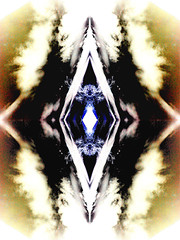ASTRAL TOTEM - WOR
 LD BURNS MOTHER STORMS
LD BURNS MOTHER STORMSOriginally uploaded by twas brillig
Re-Assimilating Spinoza:
[NOTE: The photo on right, which I found interesting, is downloaded from flickr. I do think much of communication entails both intuition and deception, but I hardly subscribe to much of the fanciful "Lillith-like" speculation posted under the photo at the flickr website.]
Dissimilation of Society:
As members of a society fail to preserve vestiges of those common grounds for inspiring, shaming, and disciplining moral values under which their society was first assimilated, they begin to lose hope of preserving mutual faith and trust.
Losing mutual faith and trust, such society cannot very well preserve either its currency or its existence as a society.
A person, country, or world simply cannot retain civilizing bearings by dead reckoning to governance elected in uninspired, spineless catering by politicians to electorates rife with hedonistic, nihilistic, division and disrespect for moral assimilation and secular law.
Losing grounding in Judeo-Christian values, how can Western Civilization intelligently expect to summon moral fiber enough to sustain itself?
What in history, philosophy, empiricism, or good sense leads Western Civilization to gamble or suppose it will sustain itself merely by transitioning through ever weakening derivatives of Spinoza into full blown, Godless Humanism?
Re-assimilation of Society:
Secular Humanists seem offended by a notion of complete subservience to, and invasion of privacy by, highest God.
But, what if God is Ineffable Synchronizing Will, of which each of us merely apprehends a particular perspective in respect of fluxing levels of holography that happen to nourish other perspectives more or less similar to our own?
Why should not such intuition of God subsume other interpretations, as figurative derivatives?
Why should not such intuition of God and ourselves help inspire and condition us towards more mutually enlightened appreciation of our interaction?
Why should not such interpretation help inspire us to seek and sustain assimilating values, reverse our splintering away to nihilism, and support more rational appreciation of our interconnection with God and one another?
Why should not such intuition of God yet command enough awe to continue to inspire existing churches and forums for facilitating receptivity and respect for assimilating, civilizing values?
****
For further discussion of happenstance anthropic holography, see http://www.youtube.com/watch?v=zidVyQe7NCo.
For “Ommm” photos of universe, see http://www.youtube.com/watch?v=3_Z5v_ZLs0o.
For Universe as a big place, see http://www.youtube.com/watch?v=mcBV-cXVWFw
For questions about “Dark Matter" (consider known unknowns, unknown unknowns, unknowable unknowns?), see http://www.youtube.com/watch?v=nJN2X3NrQAE.
2 comments:
Regarding Spinoza’s God (only basis for morality as love of an impersonal God), see:
http://www.youtube.com/watch?v=MNg6Dofx2MY
Presently, I appreciate much good sense of Einstein, see:
http://www.youtube.com/watch?v=SKt9EgENzGI.
However, Einstein’s and Spinoza’s notion of God seem slightly different from mine, perhaps in important ways.
While they recognize the hand of God in the Cosmos, they deem such Hand “impersonal.” See generally http://www.youtube.com/watch?v=vgZ3zKNYURU.
However, I prefer or intuit an alternative basis, such that God is not quite impersonal, yet not quite personal.
Even so, I do not expect that the entire Cosmos takes an interest in each tiniest event or person.
Rather, I imagine there occurs “something like” a fluxing, overlapping delegation of will, interest, and appreciation among parameters of holographic appreciation.
At highest level, broad parameters of directions and choices are given, under which subservient or underlapping parameters of directions and choices are made, under which fluxing levels of holographic events are implicated or, within allowable parameters, chosen or willed.
That is, “God” is not Nature, but is the omni-penetrating source and author of nature; God is less of pantheism than of panentheism.
I imagine that each of our perspectives of Will may appreciate interconnection with God.
Yet, as limited perspectives, we do not encompass or comprehend God, but only perspectives of God.
By our prayers, we do not command the totality of God’s powers.
Yet, in our receptive intuition, we may personally appreciate our interconnection with God.
In such, we may apprehend personal insight or intuition regarding God, leading us to more appreciate our interconnecting empathies, or “Enlightened Empathy.”
That is, our basis for morality need not be conceived or limited in respect of an impersonal God, but may be conceived in respect of empathy interconnecting among ourselves, “ourselves” being derivatively weak perspectives of God.
Compare http://littlegreenfootballs.com/tag/Pat+Condell.
Post a Comment